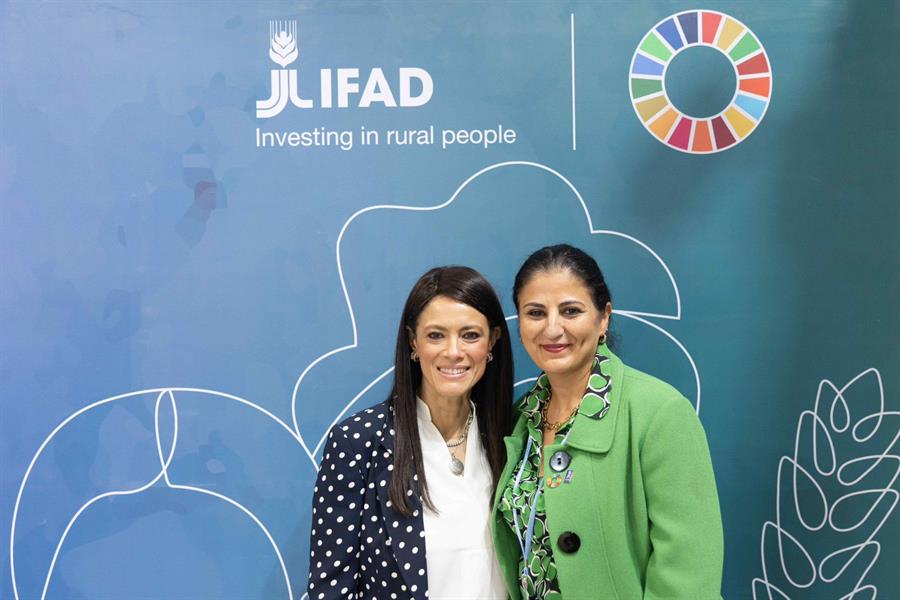Minister of Planning, Economic Development, and International Cooperation Inaugurates IFAD Regional Workshop on Private Sector Engagement in Financing Food Systems Transformation

03 December 2024
Dr. Al-Mashat: A constructive partnership with IFAD to encourage private sector investments in food security projects
Addressing food security challenges requires comprehensive strategies and collaboration among stakeholders
H.E. Dr. Rania A. Al-Mashat, Minister
of Planning, Economic Development, and International Cooperation, inaugurated
the regional workshop organized by the International Fund for Agricultural
Development (IFAD) under the theme "Engaging the Private Sector in
Financing Food Systems Transformation."
The workshop was attended by IFAD officials, government representatives,
and private sector companies. This event reflects the strong partnership
between the Arab Republic of Egypt and IFAD, as well as the joint efforts to
enhance food security.
The workshop aimed to explore
ways to strengthen collaboration between IFAD and the private sector, discuss
IFAD's private sector strategy which focuses on strengthening value chain
partnerships, rural financing, and opportunities for public-private sector
cooperation to enhance investments in sustainable food systems.
In H.E.’s speech, Dr. Rania
Al-Mashat emphasized that the workshop provides a critical platform for
exchanging ideas and perspectives among stakeholders from the Near East, North
Africa, Europe, and Central Asia to discuss both current and future challenges
in transforming food systems towards more sustainable models that contribute to
the eradication of poverty and hunger.
H.E. Dr. Al-Mashat noted that
food security is an extremely complex issue that can only be addressed through
comprehensive strategies considering social, economic, and environmental
factors directly or indirectly impacting access to sufficient and high-quality
food. To tackle this interconnected issue, there must be continuous innovation
and genuine cooperation among all stakeholders—governments, international
organizations, civil society, and the private sector.
In this context, the private
sector is a key partner in achieving the necessary transformation, as it plays
a significant role in providing innovative solutions, offering technical
expertise, and mobilizing financial resources to support and complement
government efforts to achieve food security.
H.E. Dr. Al-Mashat pointed out
that key development partners for Egypt, such as IFAD, play an essential role
in this regard by providing innovative financial tools and risk mitigation
mechanisms aimed at attracting private investment into rural development and
food system improvement projects.
H.E. Minister Al-Mashat
emphasized that these investments, supported by partnerships with international
financial institutions, contribute to driving change in the agricultural and
food sectors, improving the livelihoods of farmers and rural communities.
Despite the opportunities available, significant challenges remain in
increasing private sector participation in this essential transformation.
H.E. Dr. Al-Mashat highlighted
the urgent need to address the existing financial gap, explaining that the
funds required to transform food systems and empower smallholder farmers in
rural areas are multiples of the financing currently available. In reality, it
is not feasible to rely solely on public resources to close this substantial
gap.
Over the past two decades,
Official Development Assistance (ODA) allocated to the agricultural sector has
remained steady at only 5 to 6% of total official development aid, equating to
about $10 billion in recent years, a figure insufficient to meet the global
needs of the agricultural sector. Simultaneously, studies show that investment
in agriculture is one of the most effective ways to reduce poverty, as its
impact surpasses that of investments in other sectors in terms of improving
living standards and alleviating poverty in rural areas.
The Minister also reaffirmed the
necessity of closing this financial gap and investing available capital more
effectively by utilizing innovative financial instruments that encourage
private capital to invest in these critical areas.
H.E. Dr. Al-Mashat highlighted
Egypt's country platform for green projects, the "NWFE" program, a
nexus of water, food, and energy projects. Through this platform, the
government has collaborated with international financial institutions to
develop innovative financing mechanisms that aim to attract private sector
investment into green projects, using a mix of grants, concessional financing,
and credit guarantees. This has led to significant private sector interest in
renewable energy and agriculture projects.
H.E. Dr. Al-Mashat affirmed that
these efforts align with Egypt’s strategy for transitioning to a green economy
and enhancing food security. They showcase a model for encouraging private
sector participation in sustainable development projects that benefit society
as a whole and improve the living conditions of underserved communities in
rural and remote areas. They also represent a decisive step toward achieving
the SDGs and enhancing Egypt’s ability to address global environmental and
economic challenges.
H.E. Dr. Al-Mashat also
emphasized that, through partnerships with key development stakeholders in each
of the program’s sectors, the government is actively working to enhance private
sector involvement and attract investments in vital sectors.
H.E. Minister Al-Mashat added
that the lack of data and effective communication hinders the ability to
coordinate efforts and make evidence-based decisions. To address this issue,
the Ministry of Planning, Economic Development, and International Cooperation
has launched the "HAFIZ" platform, a hub for advisory, finance and
investment for enterprises. This platform aims to bridge the information gap by
providing various financial and non-financial services from development
partners to private sector companies. The platform offers over 90 financial and
advisory services, such as development finance, equity investments for
startups, trade financing, guarantees, and other financial tools, as well as
hundreds of local and global tender opportunities.
H.E. Dr. Al-Mashat concluded by
emphasizing that investing in human capital can empower small producers and
rural populations to establish connections with the private sector. This will
improve their livelihoods and enhance their resilience to future challenges. H.E.
noted that IFAD’s new private sector strategy and the Private Sector Financing
Program (PSFP) model are initiatives that align with Egypt’s objectives.
Through empowering, incentivizing, and aggregating private sector investments
and partnerships, IFAD is directing private investments towards generating
profitable financial returns with positive social and environmental impacts.









